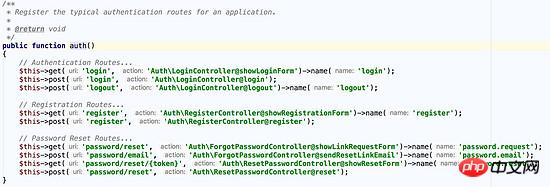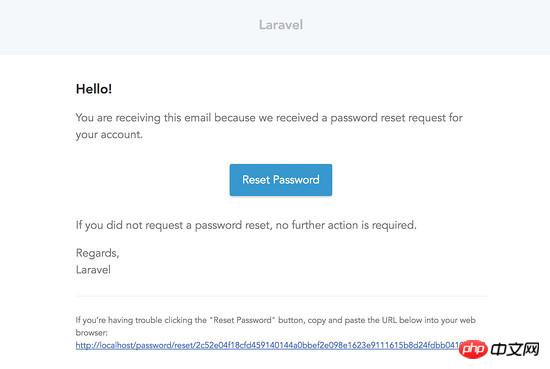 Backend Development
Backend Development
 PHP Tutorial
PHP Tutorial
 Detailed explanation of the steps to implement password reset in Laravel
Detailed explanation of the steps to implement password reset in Laravel
Detailed explanation of the steps to implement password reset in Laravel
This time I will bring you a detailed explanation of the steps to implement password reset in Laravel. What are the precautions for implementing password reset in Laravel? The following is a practical case, let's take a look.
Introduction
Want to implement this function quickly? Just runphp artisan make:auth (if you have already executed this command, you can ignore it) under the newly installed Laravel application, and then visit http://your-app.dev/ in the browser register or other URL assigned to the application, this command will generate User login Everything needed to register, including password reset!
Note: Before using the password reset function provided by Laravel, the User model must use the Illuminate\Notifications\Notifiable trait.
Database related
Before starting, verify that the App\User model implementsIlluminate\Contracts\Auth\CanResetPassword contract. Of course, Laravel's own App\User model already implements this interface and uses the Illuminate\Auth\Passwords\CanResetPassword trait to include the methods needed to implement this interface.
Generate reset token table migration
Next, the table used to store password reset tokens must be created. Laravel already comes with this table The migrations are stored in the database/migrations directory. So, all you have to do is run the migration:php artisan migrate

Routing
Laravel comes withAuth\ForgotPasswordController and Auth\ResetPasswordController controllers (These two controller classes will be automatically generated through the php artisan make:auth command), which are used to send password reset link emails and reset user passwords respectively. The routes required to reset the password have been automatically generated through the make:auth command:
php artisan make:auth
route definition In the auth method of Illuminate\Routing\Router:

View
is the same as routing, re- The view files required to set the password are also generated through the make:auth command. These view files are located in theresource<a href="http://www.php.cn/wiki/61.html" target="_blank">s/views/auth/passwords </a> directory. , you can modify the generated file accordingly as needed.
Reset password
After defining the reset user password route and view, you only need to access it through /password/reset in the browser This entry route.ForgotPasswordController that comes with the framework already contains the logic for sending password reset link emails, and ResetPasswordController contains the logic for resetting user passwords:




You can reset your password after filling in the form and submitting it.
After the password is reset, the user will automatically log in to the application and be redirected to /home. You can customize the jump link after a successful password reset by defining the redirectTo attribute of ResetPasswordController:
protected $redirectTo = '/dashboard';
Note: Default In this case, the password reset token is valid for one hour. You can change the validity time by modifying the expire option in the config/auth.php file.
Custom
Custom authentication Guard
atConfiguration file In auth.php, multiple "guards" can be configured to implement independent authentication based on multi-user tables. You can use your own by overriding the guard method on the built-in ResetPasswordController controller. Selected guard, this method will return a guard instance:
use Illuminate\Support\Facades\Auth;
protected function guard()
{
return Auth::guard('guard-name');
}Custom password broker
In the configuration file auth.php, Multiple passwords can be configured to be used to reset the password broker of multiple user tables. Similarly, you can use the broker of your choice by overriding the broker methods in the built-in ForgotPasswordController and ResetPasswordController controllers:
use Illuminate\Support\Facades\Password;
/**
* 获取密码重置期间所使用的broker.
*
* @return PasswordBroker
* @translator laravelacademy.org
*/
protected function broker()
{
return Password::broker('name');
}Custom password reset email
You can easily edit and send password reset emails Set the link to the user's notification class to implement a custom password reset email. To implement this function, you need to override the sendPasswordResetNotification method on the User model. In this method, you can use any notification you like. Class sends a notification. The first parameter received by this method is password reset $token:
/**
* 发送密码重置通知.
*
* @param string $token
* @return void
*/
public function sendPasswordResetNotification($token)
{
$this->notify(new ResetPasswordNotification($token));
}I believe you have mastered the method after reading the case in this article. For more exciting information, please pay attention to other related articles on the PHP Chinese website!
Recommended reading:
Laravel uses Redis to share Session steps detailed explanation
php recursive function case usage detailed explanation
The above is the detailed content of Detailed explanation of the steps to implement password reset in Laravel. For more information, please follow other related articles on the PHP Chinese website!

Hot AI Tools

Undresser.AI Undress
AI-powered app for creating realistic nude photos

AI Clothes Remover
Online AI tool for removing clothes from photos.

Undress AI Tool
Undress images for free

Clothoff.io
AI clothes remover

Video Face Swap
Swap faces in any video effortlessly with our completely free AI face swap tool!

Hot Article

Hot Tools

Notepad++7.3.1
Easy-to-use and free code editor

SublimeText3 Chinese version
Chinese version, very easy to use

Zend Studio 13.0.1
Powerful PHP integrated development environment

Dreamweaver CS6
Visual web development tools

SublimeText3 Mac version
God-level code editing software (SublimeText3)

Hot Topics
 1664
1664
 14
14
 1423
1423
 52
52
 1318
1318
 25
25
 1269
1269
 29
29
 1248
1248
 24
24
 Laravel Introduction Example
Apr 18, 2025 pm 12:45 PM
Laravel Introduction Example
Apr 18, 2025 pm 12:45 PM
Laravel is a PHP framework for easy building of web applications. It provides a range of powerful features including: Installation: Install the Laravel CLI globally with Composer and create applications in the project directory. Routing: Define the relationship between the URL and the handler in routes/web.php. View: Create a view in resources/views to render the application's interface. Database Integration: Provides out-of-the-box integration with databases such as MySQL and uses migration to create and modify tables. Model and Controller: The model represents the database entity and the controller processes HTTP requests.
 Solve caching issues in Craft CMS: Using wiejeben/craft-laravel-mix plug-in
Apr 18, 2025 am 09:24 AM
Solve caching issues in Craft CMS: Using wiejeben/craft-laravel-mix plug-in
Apr 18, 2025 am 09:24 AM
When developing websites using CraftCMS, you often encounter resource file caching problems, especially when you frequently update CSS and JavaScript files, old versions of files may still be cached by the browser, causing users to not see the latest changes in time. This problem not only affects the user experience, but also increases the difficulty of development and debugging. Recently, I encountered similar troubles in my project, and after some exploration, I found the plugin wiejeben/craft-laravel-mix, which perfectly solved my caching problem.
 How to learn Laravel How to learn Laravel for free
Apr 18, 2025 pm 12:51 PM
How to learn Laravel How to learn Laravel for free
Apr 18, 2025 pm 12:51 PM
Want to learn the Laravel framework, but suffer from no resources or economic pressure? This article provides you with free learning of Laravel, teaching you how to use resources such as online platforms, documents and community forums to lay a solid foundation for your PHP development journey from getting started to master.
 Laravel user login function
Apr 18, 2025 pm 12:48 PM
Laravel user login function
Apr 18, 2025 pm 12:48 PM
Laravel provides a comprehensive Auth framework for implementing user login functions, including: Defining user models (Eloquent model), creating login forms (Blade template engine), writing login controllers (inheriting Auth\LoginController), verifying login requests (Auth::attempt) Redirecting after login is successful (redirect) considering security factors: hash passwords, anti-CSRF protection, rate limiting and security headers. In addition, the Auth framework also provides functions such as resetting passwords, registering and verifying emails. For details, please refer to the Laravel documentation: https://laravel.com/doc
 Laravel framework installation method
Apr 18, 2025 pm 12:54 PM
Laravel framework installation method
Apr 18, 2025 pm 12:54 PM
Article summary: This article provides detailed step-by-step instructions to guide readers on how to easily install the Laravel framework. Laravel is a powerful PHP framework that speeds up the development process of web applications. This tutorial covers the installation process from system requirements to configuring databases and setting up routing. By following these steps, readers can quickly and efficiently lay a solid foundation for their Laravel project.
 How to view the version number of laravel? How to view the version number of laravel
Apr 18, 2025 pm 01:00 PM
How to view the version number of laravel? How to view the version number of laravel
Apr 18, 2025 pm 01:00 PM
The Laravel framework has built-in methods to easily view its version number to meet the different needs of developers. This article will explore these methods, including using the Composer command line tool, accessing .env files, or obtaining version information through PHP code. These methods are essential for maintaining and managing versioning of Laravel applications.
 What versions of laravel are there? How to choose the version of laravel for beginners
Apr 18, 2025 pm 01:03 PM
What versions of laravel are there? How to choose the version of laravel for beginners
Apr 18, 2025 pm 01:03 PM
In the Laravel framework version selection guide for beginners, this article dives into the version differences of Laravel, designed to assist beginners in making informed choices among many versions. We will focus on the key features of each release, compare their pros and cons, and provide useful advice to help beginners choose the most suitable version of Laravel based on their skill level and project requirements. For beginners, choosing a suitable version of Laravel is crucial because it can significantly impact their learning curve and overall development experience.
 The difference between laravel and thinkphp
Apr 18, 2025 pm 01:09 PM
The difference between laravel and thinkphp
Apr 18, 2025 pm 01:09 PM
Laravel and ThinkPHP are both popular PHP frameworks and have their own advantages and disadvantages in development. This article will compare the two in depth, highlighting their architecture, features, and performance differences to help developers make informed choices based on their specific project needs.



